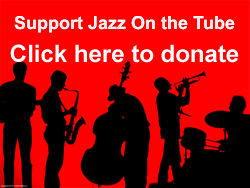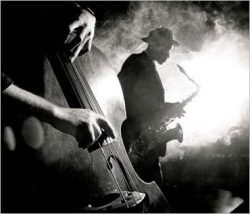History, Video
Listeners with savvy ears know you can hear a lot of “gospel” in jazz and rock and roll.
But what do we mean when we say “gospel music”?
Unlike other forms of roots music whose origins come from the distant mists of time, we know when and where the music we call gospel started.
Meet the highly underrated Thomas A. Dorsey.
Born in Georgia and settled as an adult in Chicago, he broke the cultural logjam between “church” and “honky-tonk” music and helped light a creative fire, we’re all still warming ourselves on today.
– Ken McCarthy
Jazz on the Tube
P.S. Our unique programming is made possible by help from people like you. Learn how you can contribute to our efforts here: Support Jazz on the Tube
Thanks.
History, Video
This is a continuation of my country, blues, jazz, gospel – and a lot of it came from the countryside and country people – rant from a few months ago.
We all know about the roles big cities played in the advancement of jazz. How much do we know about the role country people played?
By good fortune, I found a resource where two people, a brother and sister, who are representative of this story, go into the details of their musical life being raised in a small town in rural parts in the 30s and 40s.
My previous video on this subject
– Ken McCarthy
Jazz on the Tube
P.S. Our unique programming is made possible by help from people like you. Learn how you can contribute to our efforts here: Support Jazz on the Tube
Thanks.
History
In San Francisco, there is a church that has ‘A Love Supreme’ as its chief liturgical text.
When you think of the impact Bach’s music has had on the experience of worship, this might not be as much of a stretch as it might seem at first.
– Ken McCarthy
Jazz on the Tube
P.S. Our unique programming is made possible by help from people like you. Learn how you can contribute to our efforts here: Support Jazz on the Tube
Thanks.
History, Video
John Coltrane Quartet – “Alabama”
Pastor Munther Issac,
Evangelical Lutheran Christmas Church
in Bethlehem
December 23, 2023
Yesterday there was no Christmas in Bethlehem.
That’s not the name of a song.
It’s a simple statement of fact.
Every year, I look forward to releasing the Christmas “mix tape” because I like the idea of bringing happiness to people.
The flip side is I can’t ignore the misery and sorrow of others.
This year, halfway through Christmas morning, my wife asked if we could turn the music off and I had to agree with her.
Our family came over later and we had a good time with them, but somehow playing celebratory music did not sit right with us this Christmas.
Sixty years ago, this past September 15th, the 16th Street Baptist Church in Birmingham, Alabama was bombed by some deranged, hate-filled people, killing four young African-American girls.
The murders rightly shocked the conscience of a nation.
The perpetrators and their supporters (the first one wasn’t jailed until 14 years later) justified their crime as “protecting their way of life.”
This Christmas, as of this writing, 110 mosques and three Christian churches have been bombed in Gaza. More than 20,000 civilians have been killed, over half children with over 200 people killed in the last 24 hours alone.
For the wounded, there are no working hospitals, no medical clinics, no ambulances, and over 300 medical personnel killed. 1.2 million Gazans (4 out of 5) are now homeless and the UN has stated “there is no safe place in Gaza.”
These are the facts.
Every September 15, we play John Coltrane’s “Alabama” in memory of the lives of the four innocent little girls murdered in Birmingham.
Today we play it along with a sermon from Pastor Munther Issac of the Evangelical Lutheran Christmas Church in Bethlehem.
I don’t know what we can do to help given the monstrous indifference of our governments and news media, but we can start by not averting our eyes from this great evil and speaking out clearly against it.
The day the first child was injured this should have been stopped.
– Ken McCarthy
Jazz on the Tube
Artist-Educators, History
A shortlist of some of the master musicians who passed in 2023
A Jazz on the Tube playlist
01. Tom Williams (1962-2023) – Aggression (00:00-07:30)
02. Ahmad Jamal (1930-2023) – Darn That Dream (07:32-12:05)
03. Guido Basso (1937-2023) – My Romance (12:07-21:56)
04. Dusko Gojkovic (1931-2023) – Devojko Mala (21:58-24:33)
05. Jerry Dodgion (1932-2023) – Thadeus (24:35-31:26)
06. Carl Saunders (1942-2023) – My Foolish Heart (with Stan Kenton Alumni Big Band) (31:38 – 37:22)
07. Wayne Shorter (1933-2023) – Adam’s Apple (37:25-44:10)
08. Tony Bennett (1926-2023) – I Wanna Be Around (44:12-46:21)
09. Redd Holt (1932-2023) – Wack Wack (46:23-48:53)
10. Don Rader (1935-2023) – Anemone (48:55-53:45)
11. Jack Wilkins (1944-2023) – O Grande Amor (53:47-01:00:08)
12. Kidd Jordan (1935-2023) – Motherless (Live) (01:00:10-01:04:03)
13. Karl Berger (1935-2023) – Why the Moon Is Blue (01:04:05 – 01:09:11)
14. George Winston (1949-2023) – You’re in Love Charlie Brown (01:09:13 – 01:12:31)
15. Russell Batiste (1965-2023) – Motherfunk y’All (with Papa Grows Funk) (01:12:33- 01:17:59)
16. Carol Sloane (1937-2023) – Lover Come Back To Me (01:18:01-01:22:29)
17. Peter Nero (1934-2023) – I’ll Never Fall in Love Again (01:22:31 – 01:25:55)
18. Astrud Gilberto (1940-2023) – Agua de Beber (01:25:57-01:28:14)
19. Richard Davis (1930-2023) – Song of Gratitude (01:28:16-01:31:27)
20. Carla Bley (1936-2023) – Crazy With You (01:31:29-01:39:05)
Click here for
2024
2022
2021
2020
2019
2018
2017
2016
2015
– Ken McCarthy
Jazz on the Tube
P.S. At the end of every year, we put together a short (and frankly incomplete) playlist to honor some of the giants who passed in the previous year.
It’s a bittersweet project.
Sorrow at the loss of such great souls…Joy in the appreciation of what beautiful gifts they made to all of us with their lives.
Join Jazz on the Tube fans around the world in celebrating and honoring these great artists – and please share the link.
Thanks.
History
Juke joints, bordellos, speakeasies….
The roots of jazz?
Not quite.
The real engine of the music revealed in this documentary about Sister Rosetta Tharpe.
The focus of the documentary is on her massive influence on rock and roll, but she as a young woman she was a very popular jazz singer too.
– Ken McCarthy
Jazz on the Tube
P.S. Our unique programming is made possible by help from people like you. Learn how you can contribute to our efforts here: Support Jazz on the Tube
Thanks.


